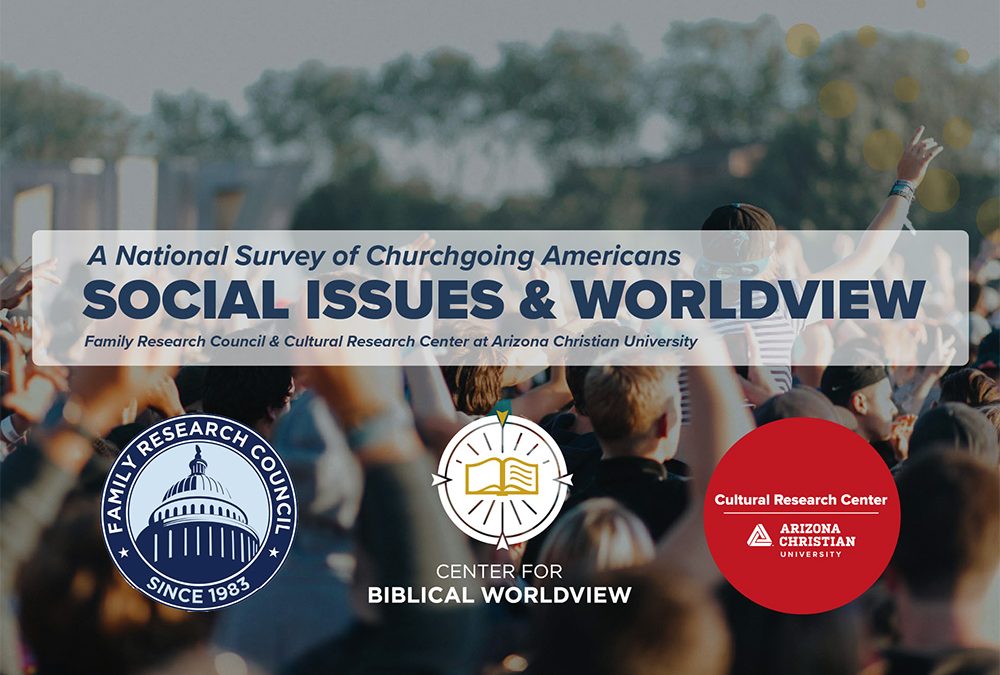GLENDALE, AZ (November 13, 2025) — A new national study conducted by the Family Research Council (FRC) and the Cultural Research Center (CRC) at Arizona Christian University reveals that regular churchgoers are abandoning traditional biblical beliefs and conservative values.
Despite regular attendance, the latest findings point to widespread loss of biblical clarity, growing confusion about moral issues, and continued shifts away from longstanding conservative political alignment among U.S. churchgoers.
“This generation of churchgoers is increasingly unsure of what they believe—or why,” said Dr. George Barna, Director of Research at CRC and Senior Research Fellow at FRC’s Center for Biblical Worldview.
“It is embarrassing how poorly informed the Christian community is about the foundational perspectives and applications of its faith. The all-too-common dismissal of worldview reflects an indifference to the very beliefs that should shape their lives,” explained the veteran researcher and author of the study.
The findings come from a national study of adults who attend Christian church services at least once a month. The joint FRC-CRC project, “Social Issues and Worldview: A National Survey of Churchgoing Americans,” examined churchgoers’ worldview awareness, biblical beliefs, political alignment and engagement, and attitudes toward major social issues. Today’s release is the second of two reports from Barna evaluating the study’s findings.
The study exposed significant worldview confusion, as nearly one in two churchgoers now say they lack a worldview or are uncertain whether they have one, up from 38% in 2023. While almost one-third (30%) believe they hold a biblical worldview, the research shows that just 11% actually meet that standard. Even more concerning, fewer than half (47%) believe it is “very important” for Christians to have a biblical worldview—a sharp decline from 59% in 2023.
According to the survey, only a small plurality of regularly churched adults (34%) now identify as conservative on fiscal and social issues, while nearly as many describe themselves as moderate (29%) or liberal/progressive (19%). Another 10% determine their views issue by issue, and 8% are unsure of their ideological leanings.
Compared to two years ago, churchgoers have clearly moved toward the ideological middle: the share identifying as moderate rose sharply from 19% to 29%, while conservative and liberal identification increased only modestly.
And despite high voter registration and turnout—93% and 84% respectively—fewer believers are grounding their political decision-making in Scripture. Just 46% said they base their vote primarily on biblical teaching, down from 51% in 2023, the study found.
According to said Dr. David Closson, Director of FRC’s Center for Biblical Worldview, the findings highlight the need for renewed biblical teaching and formation—beginning at home and in the pulpit.
“When half of churchgoing adults say they don’t even know if they have a worldview, it underscores how urgently pastors and parents must recommit to teaching biblical truth from the pulpit and around the dinner table,” Closson explained. “The answer to these trends is not despair, but a return to the faithful proclamation of God’s Word. We must help Christians connect their zeal for God with the knowledge of God, as Scripture commands in Romans 10:2.”
Other key findings from the research study include:
- Biblical worldview in decline: Although nearly one-third (30%) of regular churchgoers believe they have a biblical worldview, only 11% actually do. Nearly half of churchgoers say they do not have a worldview or are unsure if they do, a significant rise from two years ago. Even more concerning, fewer than half now say having a biblical worldview is “very important,” down sharply from 59% in 2023.
- Moral clarity fading: Fewer churchgoers now believe the Bible speaks clearly on critical moral issues. Belief in biblical clarity fell from 65% to 51% on abortion (-14 points), from 59% to 47% on homosexuality (-12 points), and from 55% to 39% on transgenderism (-16 points)—sharp, double-digit declines across all three issues.
- Lukewarm toward Israel: Only 60% say it is “very important” for Christians to pray for Israel—an unexpectedly low level of support, particularly among younger adults.
- Confidence in Scripture declining: Only 54% believe the Bible is the true or inspired, error-free Word of God, and only 61% affirm belief in the God described in Scripture.
- Choosing socialism: One in three churchgoers (32%) now prefer socialism—a proportion virtually unchanged from 2023 (30%). Support is strongest among a number of demographic groups, including younger adults, high-income earners, and those without a biblical worldview.
Barna emphasized that while the findings are sobering, the moment presents a profound opportunity.
“The combination of ignorance and apathy represents a tremendous opportunity for faithful Christians and church leaders to clearly and unapologetically teach the fundamentals of the faith,” Barna explained. “That kind of clarity can lead to transformed lives in a spiritually confused society.”
Closson added that, despite the concerning findings, there is reason for hope. “The good news is that this kind of clarity and conviction can be recovered.”
“As the research shows, there’s still a strong foundation of spiritual interest and participation in local churches. But it’s time for that activity to be grounded once again in truth,” he said.
The full FRC/CRC research study: “Social Issues and Worldview: A National Survey of Churchgoing Americans,” is available here.
The second of two reports from Dr. George Barna, “Churchgoers Exhibit Significant Changes in Political and Religious Beliefs, and Lifestyles,” is available here.

